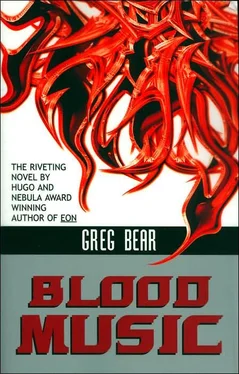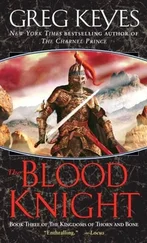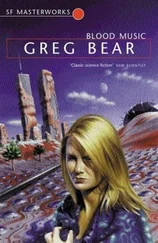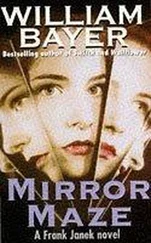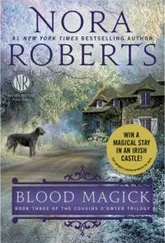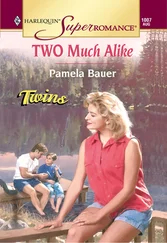Gregory Bear - Blood Music
Здесь есть возможность читать онлайн «Gregory Bear - Blood Music» весь текст электронной книги совершенно бесплатно (целиком полную версию без сокращений). В некоторых случаях можно слушать аудио, скачать через торрент в формате fb2 и присутствует краткое содержание. Город: New York, Год выпуска: 2005, ISBN: 2005, Издательство: ibooks, Incorporated, Жанр: Фантастика и фэнтези, на английском языке. Описание произведения, (предисловие) а так же отзывы посетителей доступны на портале библиотеки ЛибКат.
- Название:Blood Music
- Автор:
- Издательство:ibooks, Incorporated
- Жанр:
- Год:2005
- Город:New York
- ISBN:1596871067
- Рейтинг книги:4 / 5. Голосов: 1
-
Избранное:Добавить в избранное
- Отзывы:
-
Ваша оценка:
- 80
- 1
- 2
- 3
- 4
- 5
Blood Music: краткое содержание, описание и аннотация
Предлагаем к чтению аннотацию, описание, краткое содержание или предисловие (зависит от того, что написал сам автор книги «Blood Music»). Если вы не нашли необходимую информацию о книге — напишите в комментариях, мы постараемся отыскать её.
Blood Music — читать онлайн бесплатно полную книгу (весь текст) целиком
Ниже представлен текст книги, разбитый по страницам. Система сохранения места последней прочитанной страницы, позволяет с удобством читать онлайн бесплатно книгу «Blood Music», без необходимости каждый раз заново искать на чём Вы остановились. Поставьте закладку, и сможете в любой момент перейти на страницу, на которой закончили чтение.
Интервал:
Закладка:
“It’s tough just being human again, you know?” he said. “It’s lonely. So we’ll go back, yes.”
“Lonely? What about how I’ll feel? You’ll be dead again.”
“Not dead, Seedling. You know that.”
“Might as well be.”
“You could join us.”
Suzy started trembling. “Kenny, I am afraid. ”
“Look. They left you, like you asked, and they’re letting you go. Though what you’ll do out there, I don’t know. The city’s not made for people any more. You’ll be fed and you’ll live okay, but… Suzy, everything’s changing. The city will change more. You’ll be in the way… but they won’t hurt you. If you choose, they’ll set you aside like a national park.”
“Come with me, Kenny. You and Howard and Mom. We could go back—”
“Brooklyn doesn’t exist any more.”
“Jesus, you’re like a ghost or something. I can’t talk sense to you.”
Kenny pointed to the elevator. “Seedling—”
“Stop calling me that, goddammit! I’m your sister, you creep! You’re just going to leave me out there—”
“That’s your choice, Suzy,” Kenneth said calmly.
“Or make me a zombie.”
“You know we’re not zombies, Suzy. You felt what they’re like, what they can do for you.”
“But I won’t be me anymore!”
“Stop whining. We all change.”
“Not that way!”
Kenneth looked pained. “You’re different than you were when you were a little girl. Were you ever afraid of growing up?”
She stared at him. “I am still a little girl,” she said. “I’m slow. That’s what everybody says.”
“Were you ever afraid of not being a baby? That’s the difference. Everybody else is still locked into being babies. We’re not. You could grow up, too.”
“No,” Suzy said. She turned away from the elevator. “I’m going back to talk to Mom.” Kenny grabbed her by the arm.
“They’re not there anymore,” he said. “It’s a real strain, being rebuilt like this.”
Suzy gaped at him, then ran into the elevator and leaned against the back wall. “Will you come down with me?” she asked.
“No,” Kenneth said. “I’m going back. We still love you, Seedling. We’ll watch over you. You’ll have more mothers and brothers and friends than you’ll ever know. Maybe you’ll let us be with you, sometime.”
“You mean, inside me, like them?”
Kenneth nodded. “We’ll always be around. But we aren’t going to rebuild our bodies for you.”
“I want to go down now,” she said.
“Going down, then” Kenneth said. The elevator doors started to close. “Good-bye, Suzy. Be careful.”
“KennnNETHHH!” But the door closed and the elevator descended. She stood in the middle of the floor and ran her fingers through her long, stringy blond hair.
The door opened.
The lobby was a webwork of gray, solid-looking arches supporting the upper mass of the tower. She imagined—or perhaps remembered what they had shown her—the elevator shaft and the restaurant deck being all that remained of the original tower, left specially for her.
Where will I go?
She stepped on the gray and red speckled floor—not carpet, not concrete, but something faintly resilient, like cork. A brown and white sheet—the last she saw of that particular substance—slid down over the elevator door and sealed it with a hissing noise.
She walked through the webwork of arches, stepping over cylindrical humps in the red and gray surface, leaving the shadow of the transformed tower and standing in half-clouded daylight.
The north tower stood alone. The other tower had been dismantled. All that remained of the World Trade Center was a single rounded spire, smooth and glossy gray in some areas, rough and mottled black in others, with a hint of webwork in patterns pushing up through the outer material.
From the transformed plaza, covered with feathery treelike fans, to the waterfront, there was nothing more than twenty feet tall.
She walked between the fans, waving gently on their shiny red trunks, down to the shore. The water was a solid, gelatinous green-gray, no waves, smooth as glass and just as shiny. She could see the pyramids and irregular spheres of Jersey City, like a particularly weird collection of children’s blocks and toys; the reflection in the solid river was vivid and perfect.
The wind sighed pleasantly. It should have been cold or at least cool, but the air was warm. Already her chest hurt with not crying. “Mother,” she said, “I just want to be what I am. Nothing more. Nothing less.” Nothing more? Suzy, that’s a lie.
She stood by the shore for a long time, then turned and began her hike into Manhattan Island.
41
To Bernard, the ridiculous environment he had lived in for so many weeks seemed the lesser of two realities.
He did little work now. He lay back on the bed, keyboard under his arm, thinking and waiting. Outside, he knew, the tension was building. He was the focus.
Paulsen-Fuchs could not prevent two million people from getting at him, destroying him and the lab. (Villagers with torches; he was both Dr. Frankenstein and the monster. Ignorant frightened villagers doing God’s work.)
In his blood, his flesh, he carried part of Vergil I. Ulam, part of his father and mother, parts of people he had never known, people perhaps thousands of years dead. Within, there were millions of duplicates of himself, sinking deeper into the noocyte world, discovering the layers and layers of universes within the biologic: old, new and potential.
And yet—where was the insurance policy, the guarantee that he wasn’t being deceived? What if they were simply conjuring false dreams to make him quiescent, to drug him for the metamorphosis? What if their explanations were all sugar-coated phrases meant to reassure? He had no evidence the noocytes lied—but then, how could one tell when something so alien lied, or if “he” was even an accessible concept for them?
(Olivia. She had broken her engagement, he learned much later, two months after their single date. They had smiled at each other on the last day of class—and passed out of each other’s lives. He had been—what? Shy, inept? Too romantic, too in love with that single lovely and Petrarchan night? Where was she—in the North American biomass?)
And even if he accepted what he had been told, he had certainly not been told everything. A million questions remained, some idle, most crucial. He was still, after all, an individual (wasn’t he?) anticipating a virtually unknown experience.
The command clusters—the researchers—none answered him now.
In North America—what happened to all the bad people whose memories were preserved by the noocytes? They were, to be sure, suspended from the world in which they had been bad just as surely as if they were in prison—far more suspended. But being bad meant bad thinking, being evil meant being a cancer cell in the society, a dangerous and inexplicable screw-up, and he was not just thinking of ax murderers. He was thinking of politicians too greedy or blind to know what they were doing, white collar sharpies who had swindled the life’s savings from thousands of investors, mothers and fathers too stupid to know you shouldn’t beat your children to death. What happened to these people and to the millions of screw-ups, evil screw-ups, in human society?
Were all truly equal, duplicated a million times, or did the noocytes exercise a little judgment? Did they quietly delete a few personalities, edit them out… or alter them?
And if the noocytes took the liberty of altering the real screw-ups, perhaps fixing them or immobilizing them some way, going into their thought processes and using a kind of grand consensus of right thinking as a pattern for corrections—
Читать дальшеИнтервал:
Закладка:
Похожие книги на «Blood Music»
Представляем Вашему вниманию похожие книги на «Blood Music» списком для выбора. Мы отобрали схожую по названию и смыслу литературу в надежде предоставить читателям больше вариантов отыскать новые, интересные, ещё непрочитанные произведения.
Обсуждение, отзывы о книге «Blood Music» и просто собственные мнения читателей. Оставьте ваши комментарии, напишите, что Вы думаете о произведении, его смысле или главных героях. Укажите что конкретно понравилось, а что нет, и почему Вы так считаете.
